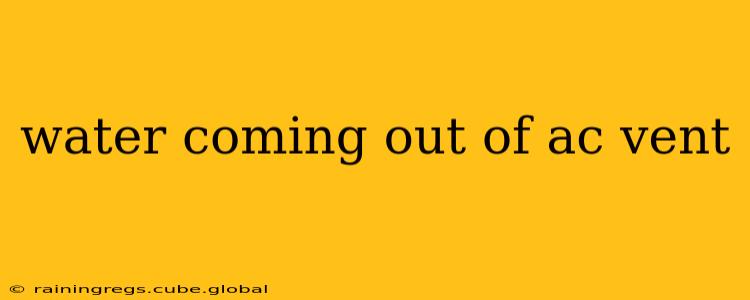Finding water leaking from your air conditioning vent is alarming, but understanding the cause can quickly alleviate your concerns. This comprehensive guide explores the common reasons behind this issue, offering practical solutions to get your AC system back in optimal condition. We'll cover everything from simple fixes to more serious problems requiring professional attention.
Why is Water Coming Out of My AC Vent?
Water leaking from your air conditioning vent is usually a symptom of a problem within your AC system, not the vent itself. Several factors can contribute to this issue, ranging from condensation buildup to more serious malfunctions. Let's delve into the most frequent culprits.
1. Clogged Condensate Drain Line:
This is by far the most common reason for water leaking from an AC vent. Your air conditioner produces condensation as it cools the air. This condensate is typically drained away through a condensate drain line. If this line becomes clogged with algae, mold, mildew, or debris, the water will back up and overflow, potentially leaking from vents.
Solution: Carefully locate and clear the condensate drain line. You might need a wet/dry vacuum or a plumbing snake to remove the blockage. Regular maintenance, including flushing the drain line with a solution of water and drain cleaner (following product instructions carefully), can prevent future clogs.
2. Frozen Evaporator Coil:
A frozen evaporator coil restricts airflow, leading to a buildup of ice that can eventually melt and leak water. This freezing often occurs due to:
- Restricted Airflow: Dirty air filters, clogged vents, or obstructions around the unit can restrict airflow, causing the evaporator coil to freeze.
- Low Refrigerant: Insufficient refrigerant prevents the coil from absorbing enough heat, leading to freezing.
- Faulty Blower Motor: A malfunctioning blower motor may not circulate enough air, contributing to freezing.
Solution: Addressing the underlying cause is crucial. Change or clean your air filter. Check for and remove obstructions. For low refrigerant or a faulty blower motor, professional AC repair is necessary. Never attempt to thaw a frozen evaporator coil yourself using a hairdryer or other heat sources; this can damage your system.
3. Leaky Condensation Pan:
The condensation pan sits beneath the evaporator coil and collects the condensate. If this pan cracks or develops leaks, water will escape and potentially leak into your ductwork and out of vents.
Solution: A leaky pan usually requires replacement. A professional HVAC technician can assess the damage and install a new pan.
4. Problems with the AC Unit Itself:
Sometimes, water leaking from a vent indicates a more serious problem within the AC unit, such as:
- Refrigerant Leak: A leak in the refrigerant lines can cause the system to malfunction and potentially lead to water leakage.
- Cracked Ductwork: A crack or hole in the ductwork can allow water to escape from the system.
- Overcharged System: Too much refrigerant can also cause issues.
Solution: For these problems, you absolutely need a qualified HVAC technician to diagnose and repair the issue. Ignoring a refrigerant leak can cause further damage to the system and even void your warranty.
How to Prevent Water Leaks from Your AC Vents?
Proactive maintenance is key to preventing future water leaks:
- Regular Air Filter Changes: Change your air filter every 1-3 months, depending on usage and filter type.
- Annual AC Inspections: Schedule annual inspections by a qualified HVAC technician to identify and address potential problems early on.
- Condensate Drain Line Maintenance: Regularly flush your condensate drain line to prevent clogs.
- Proper Ventilation: Ensure adequate ventilation around your air conditioning unit to prevent overheating and freezing.
By understanding the potential causes and taking preventive measures, you can significantly reduce the risk of experiencing water leaking from your AC vents, maintaining a comfortable and dry indoor environment. Remember, for serious issues, always call a qualified professional.
